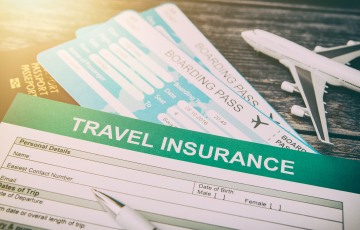Compare Travel Insurance Price: Empower Your Journey
When planning a trip, whether it's a quick weekend getaway or a months-long journey around the world, one crucial aspect that should never be overlooked is travel insurance. This safety net can be a lifesaver, covering unexpected costs due to emergencies such as medical issues, lost luggage, or trip cancellations. The peace of mind that comes from knowing you can recover your losses makes travel insurance a must-have for savvy travelers.
However, with so many insurance providers and varying levels of coverage available, finding the right policy at the best price can feel overwhelming. The key is knowing how to compare travel insurance prices effectively, ensuring you're not only getting a great deal but also the appropriate coverage for your needs.
Travelner Insurance aims to guide you through the process of comparing travel insurance prices. We will provide you with practical tips and insights on how to navigate through the options, identify key factors that affect pricing, and ultimately, help you make an informed decision. Let’s explore with us now!

Travel insurance is a crucial safety net for travelers providing peace of mind and ensuring recovery of losses.
1. Understanding Travel Insurance
Travel insurance serves as a safety net, providing financial protection against unforeseen circumstances during your trip. It typically covers expenses related to medical emergencies, trip cancellations, lost luggage, and other mishaps.
There are various types of travel insurance, including single trip, annual multi-trip, and specialty policies tailored for specific activities like adventure sports or cruises.
1.1. Annual Travel Insurance (Multi-Trip Insurance):
Annual travel insurance is a policy designed to cover all trips you take within a 12-month period.
It’s ideal for frequent travelers—whether they are business travelers, students studying abroad, or vacationers who take multiple trips per year.
1.2. Single Trip Insurance:
Single trip insurance is purchased for coverage on one specific trip, from the day of departure to the day of return. It is suited for travelers who do not travel as frequently or who need specific coverage tailored to a particular journey.
1.3. Annual vs. Single Trip Insurance: Which is More Cost-Effective?
Choosing between an annual travel insurance policy and single-trip insurance policies is crucial, especially for those who travel frequently. The decision largely depends on your travel habits, the nature of your trips, and financial considerations.
Understanding when to use "annual travel insurance compare prices" to evaluate which option offers the best value can save you money and hassle.
a. Flexibility and Convenience:
Annual policies offer significant convenience, eliminating the need to purchase a new policy for each trip. This is particularly beneficial for last-minute or unplanned travels, as you’re covered automatically.
b. Coverage Consistency:
With an annual policy, you enjoy consistent coverage terms for all trips, which helps in familiarizing yourself with the terms and conditions, minimizing the risk of encountering unexpected exclusions.

An annual policy ensures consistent coverage terms for all trips.
2. Why Compare Travel Insurance Prices?
When it comes to securing travel insurance, many travelers may opt for the first policy they come across or choose a provider they are familiar with without exploring other options.
However, compare travel insurance price is not just about finding the cheapest offer—it's about discovering the best value that covers your specific needs while saving money.
Understanding and utilizing the practice to compare holiday insurance prices can significantly enhance your financial benefits while safeguarding your travel plans.
2.1. Financial Benefits of Compare Travel Insurance Price
a. Cost Savings:
By comparing different travel insurance policies, travelers can see significant differences in premiums for similar levels of coverage.
Insurance companies often have varying criteria for pricing based on risk assessment, operational costs, and competitive strategies.
Through effective comparison, you can find a policy that offers the best rate for the cover you need, potentially saving a substantial amount of money.
b. Customized Coverage:
Comparing plans allows you to choose a policy that matches your specific travel needs without paying for unnecessary extras. For example, if your trip doesn't include adventure sports, you can opt out of cover for this, thereby reducing the cost.
c. Promotional Offers & Discounts:
Often, insurance providers offer special discounts or promotional codes for online purchases.
Comparing prices lets you take advantage of these offers, which are sometimes exclusive to online platforms or specific comparison sites.
2.2. Crucial Scenarios Where Travel Insurance Has Proven Essential
a. Medical Emergencies:
While traveling abroad, encountering a medical emergency can be not only stressful but also extremely costly.
Travel insurance that has been compared and chosen for comprehensive medical coverage can cover expenses from minor medical treatments to major medical evacuations.
This coverage is indispensable in countries where healthcare is expensive or for travelers with pre-existing conditions.
b. Trip Cancellations:
Life is unpredictable, and sudden events like illness, family emergencies, or even bankruptcy of a travel agency can lead to trip cancellations.
Without insurance, pre-paid, non-refundable expenses can turn into significant financial losses.
A well-chosen travel insurance policy covers these costs, providing reimbursements that would not be possible otherwise.
c. Lost or Stolen Baggage:
Losing personal belongings or having them stolen can disrupt your travel plans and incur unexpected expenses.
Travel insurance can cover the cost of replacing your items and even provide you with emergency cash in some cases.

Travel insurance can help cover the cost of replacing lost or stolen baggage, and may even provide emergency cash in certain cases.
3. Key Factors Influencing When Compare Travel Insurance Costs
When it comes to choosing the right travel insurance, understanding the factors that influence the cost can help you make an informed decision.
Various elements can affect how insurers calculate premiums, and knowing these can aid in comparing travel insurance costs effectively. Here’s a detailed look at the primary factors:
3.1. Destination:
The destination of your travel plays a critical role in determining insurance costs. High-risk countries, either due to political instability, high crime rates, or poor healthcare systems, tend to have higher insurance premiums.
Conversely, traveling to countries with stable environments and excellent healthcare facilities might cost less in terms of insurance.
3.2. Duration of the Trip:
The length of your stay significantly impacts the price of your travel insurance. Longer trips result in higher premiums because the probability of something going wrong increases with time.
Short trips may cost less to insure, but the daily rates might be higher compared to the per-day cost of a longer trip. When comparing travel insurance costs, consider how the length of your stay affects the overall price.
3.3. Age of Travelers:
Age is another critical factor insurers consider when pricing travel insurance policies.
Typically, older travelers face higher premiums because they are statistically more likely to need medical treatment while traveling. For younger travelers, especially children, premiums might be lower.
However, very young children and infants might slightly increase the cost again due to their vulnerability.
3.4. Types of Coverage:
The scope and type of coverage you choose will also impact your travel insurance cost. Basic plans that cover only essential items like trip cancellation and emergency medical are generally cheaper.
Comprehensive plans, which may include high coverage limits for medical expenses, evacuation costs, and include extras like baggage loss and delay cover, naturally cost more.
Optional add-ons, such as coverage for adventure sports, pre-existing conditions, or rental car excess can also increase the premium.
3.5. Medical Conditions & Coverage Limits:
Pre-existing medical conditions are a significant factor in insurance cost calculations.
Policies that cover these conditions are generally more expensive due to the higher risk of medical treatment being needed while abroad.
Similarly, choosing a higher coverage limit, which provides more substantial financial protection, will also increase the cost of your insurance.
3.6. Group Size:
Insuring a group or family can affect the cost differently depending on the insurer. Some offer discounts for group policies, while others might calculate the premium based on the individual risk factors of each member.

Insurance costs for a group or family can vary depending on the insurer.
4. Guide to Comparing The Best Price for Travel Insurance
Finding the right travel insurance at an affordable price can be daunting, but with the right approach, it can be straightforward. Here’s a step-by-step guide to help you compare travel insurance prices effectively online.
4.1. Step 1 - Gather Your Travel Details:
Before you start compare travel insurance price, have all relevant information handy.
This includes your travel dates, destinations, the number of people traveling, their ages, and any specific activities you plan to undertake that might require additional coverage, such as skiing or scuba diving.
4.2. Step 2 - Visit Comparison Websites:
Comparison websites are invaluable tools for efficiently comparing a wide range of insurance policies.
Travelner Insurance website allow you to enter your travel details once and view quotes from multiple policies that fix your needs.
4.3. Step 3 - Evaluate the Policies:
Once you have a list of potential policies, it’s important for you to review:
a. Coverage Details:
Look beyond the price to understand what is and isn't covered. Check limits on medical expenses, evacuation costs, and deductibles.
b. Exclusions:
Understand what the insurance does not cover. Common exclusions include extreme sports, certain pre-existing conditions, or traveling to high-risk countries.
4.4. Step 4 - Purchase and Double-Check:
Once you’ve decided on a policy, purchase it directly. After purchasing, review your policy documents carefully to ensure that all the information is correct and that you understand your coverage.

Secure travel insurance for any trip, providing financial protection against unforeseen circumstances.
5. Common Mistake to Avoid When Buying Travel Insurance
Navigating the world of travel insurance can be complex, and it's easy to make mistakes that can end up costing you dearly if you're not careful.
Here are some common pitfalls to avoid when buying travel insurance, ensuring you get the coverage you need at a price that makes sense.
5.1. Choosing the Cheapest Option Without Considering Coverage
One of the most common mistakes is opting for the least expensive policy without closely examining what it covers.
While saving money is important, an affordable policy that doesn’t cover essential needs, like adequate medical expenses or evacuation costs, can end up being more costly in the event of an emergency. Always compare the coverage details, not just the price.
5.2. Overlooking Important Exclusions
Every travel insurance policy comes with exclusions, and failing to read them carefully can lead to unpleasant surprises.
Common exclusions include pre-existing medical conditions, extreme sports, and travel to high-risk destinations. Therefore, you should make sure the policy you choose does not exclude activities you plan to engage in or health issues you may face.
5.3. Ignoring the Need for Sufficient Medical Coverage
Medical treatment abroad can be exceedingly expensive, and inadequate medical coverage is a significant risk.
Ensure that the medical coverage limit of your travel insurance is high enough to cover potential hospitalization, medical treatment, and emergency evacuation if necessary.
Conclusion
When it comes to planning any trip, whether it's a short getaway or an extended adventure, securing the right travel insurance is paramount. Travel insurance acts as a safety net, providing financial protection against unforeseen circumstances such as medical emergencies, trip cancellations, and lost luggage.
To effectively compare travel insurance price, travelers should follow a step-by-step guide, gathering travel details, visiting comparison websites, evaluating policies based on coverage details and exclusions, and finally, making an informed purchase with Travelner Insurance!
Explore tailored travel insurance and protect your trip now!
Related articles

Jun 25, 2024
Compare Annual Travel Insurance Plans: Find the Perfect Protection for Your Frequent Travels

Jun 19, 2024
Unpacking IMG Travel Insurance Reviews: Is It the Right Choice for Your Travel Needs?

Jun 18, 2024
Compare Travel Insurance Packages: A Comprehensive Guide

Jun 18, 2024







